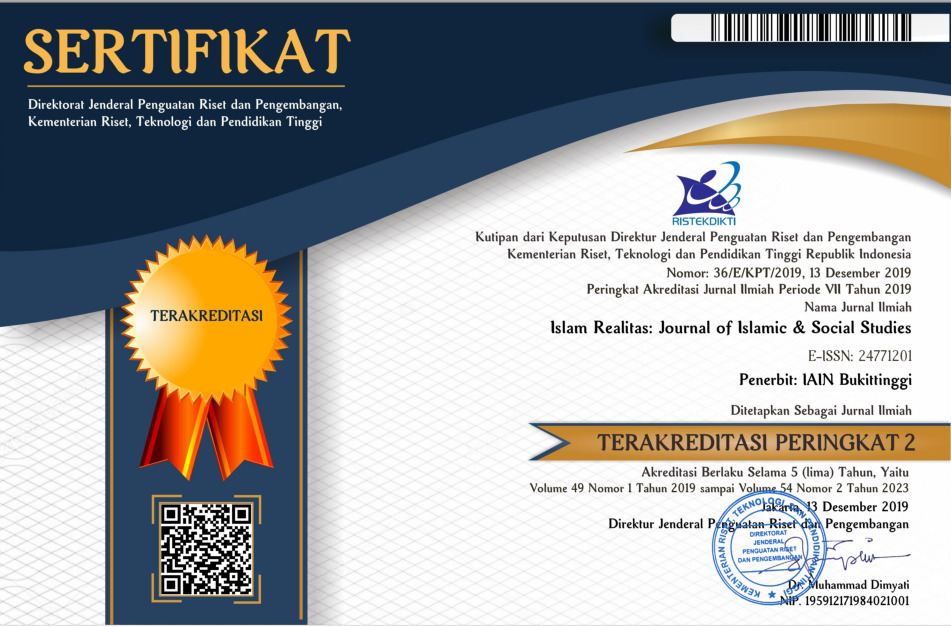Language, Religion, and Modernity: Zaki Naguib Mahmud's Islamic Rationalism Philosophy
DOI:
https://doi.org/10.30983/fuaduna.v6i2.5559Keywords:
Language, Religion, Modernity, Islamic Rationalism, Zaki Naguib Mahmud.Abstract
References
Abdillah, Junaidi. “Dekonstruksi Tafsir Antroposentrisme: Telaah Ayat-Ayat Berwawasan Lingkungan.†Kalam 8, no. 1 (July 1, 2014): 65–86. https://doi.org/10.24042/klm.v8i1.168.
al Bahi. Al-Fikr al-Islami al-Hadis Wa Sillatuhu Bi al-Isti’mar al-Gharbi. Kairo: Maktabah al-Wahbah, 1997.
Al Jabiri, Muhammad Abid. Agama, Negara, Dan Penerapan Syariah. Yogyakarta: Fajar Pustaka Baru, 2001.
———. Takwin Al-’Aql al-’Arabiy. al-Markaz ats-Tsaqafi al-’Arabi, 1991.
———. Wijhah Nazar: Nahw I’adah Bina’ Qadaya al-Fikr al-’Arabi al-Mu’asir. Markaz Dirasat al Wihdah al Arabiyah, 1994.
Anang, Arif Al, and Ahmad Husein. “Genealogi Aliran-Aliran Politik Dalam Islam.†Fajar Historia: Jurnal Ilmu Sejarah Dan Pendidikan 4, no. 2 (December 31, 2020): 68–79. https://doi.org/10.29408/fhs.v4i2.2592.
Arosoaie, Aida. “Understanding the Creation and Radicalisation of the Students Islamic Movement of India (SIMI) and the Indian Mujahideen (IM).†South Asia: Journal of South Asian Studies 41, no. 3 (July 3, 2018): 519–34. https://doi.org/10.1080/00856401.2018.1469205.
Dardiri, Taufiq A. “Perkembangan Puisi Arab Modern.†AdabiyyÄt: Jurnal Bahasa dan Sastra 10, no. 2 (December 19, 2011): 283–308. https://doi.org/10.14421/ajbs.2011.10204.
Dziekan, M. “Miedzy Wschodem a Zachodem. Filozlfia Arabska w Koncepcji Zakiego Nadziba Mahmuda (1905-1993).†Studia Philosophiae Christianae 42, no. 2 (2006).
Fadhil, Ahmad. “Sinergi Agama dan Ilmu dalam Pemikiran Zaki Najib Mahmud.†Al Qalam 17, no. 86 (September 29, 2000): 1–28. https://doi.org/10.32678/alqalam.v17i86.663.
Fair, C. Christine. “Students Islamic Movement of India and the Indian Mujahideen: An Assessment.†Asia Policy 9, no. 1 (2010): 101–19. https://doi.org/10.1353/asp.2010.0002.
Farraj, A. “مجلة الثقاÙØ© لسنه 1951 العدد 659.†Accessed December 29, 2022. https://archive.alsharekh.org/MagazinePages/MagazineBook/AL_thqafa/althaqafa_1951/Issue_659/index.html.
Foss, Clive. “Kemal Atatürk: Giving a New Nation a New History.†Middle Eastern Studies 50, no. 5 (September 3, 2014): 826–47. https://doi.org/10.1080/00263206.2014.913574.
Ghozi, Ghozi. “Perspektif Zakî Najîb Mahmûd Tentang Ilmu Dan Agama Dalam Logika Positivisme.†Teosofi: Jurnal Tasawuf Dan Pemikiran Islam 1, no. 1 (June 4, 2011): 55–74. https://doi.org/10.15642/teosofi.2011.1.1.55-74.
Gibb, H.A.R. Aliran-Aliran Modern Dalam Islam. Jakarta: Tinta Mas, 1952.
Hannase, Mulawarman. “Transmisi Wahyu: Antara Filsafat Takwil Nasr Hamid Abu Zaid dan Teori ‘Message Production’ Ilmu Komunikasi.†Mumtaz: Jurnal Studi Al-Quran dan Keislaman 1, no. 2 (2017): 1–16. https://doi.org/10.36671/mumtaz.v1i2.7.
Kodal, T. “Atatürk ve Türk Ocakları – Türk Ocakları.†Accessed December 29, 2022. https://www.bursaturkocagi.org.tr/ataturk/ataturk-ve-turk-ocaklari/.
Mahmud, Zaki Naguib. Al-Ma’qul Wa al-La Ma’qul Fi Turatsina al-Fikri. Kairo: Dar asy Syuruq, 1987.
———. Budzur Wa Judzur. Kairo: Dar asy Syuruq, 1990.
———. Fi Hayatina Al-’Aqliyah. Kairo: Dar asy Syuruq, 1981.
———. Hashad As-Sinin. Kairo: Dar asy Syuruq, n.d.
———. Qiyam Min At-Turats. Kairo: Dar asy Syuruq, 1984.
———. Tajdid Al-Fikr al-’Arabi. Kairo: Dar asy Syuruq, 1993.
Mahmudi, Wildana Latif. “Pertumbuhan Aliran-Aliran Dalam Islam Dan Historinya.†Bangun Rekaprima: Majalah Ilmiah Pengembangan Rekayasa, Sosial Dan Humaniora 5, no. 2,Oktober (October 1, 2019): 78–86. https://doi.org/10.32497/bangunrekaprima.v5i2,Oktober.1578.
Makaradze, Emzar. “The Role of Mustafa Kemal Atatürk in Republican Turkey.†Historia i Polityka, no. 32 (39) (June 1, 2020): 153. https://doi.org/10.12775/HiP.2020.021.
Nasution, Harun. Pembaharuan Dalam Islam: Sejarah Pemikiran Dan Keagamaan. Jakarta: Bulan Bintang, 1996.
Othman Elkhosht, Mohamed. “Contemporary Islamic Philosophy Response to Reality and Thinking Outside History.†Journal of Humanities and Applied Social Sciences 1, no. 1 (January 1, 2019): 2–24. https://doi.org/10.1108/JHASS-05-2019-001.
Parvez, Z. Fareen. “Politicizing Islam Across North and South.†In Politicizing Islam: The Islamic Revival in France and India, edited by Z. Fareen Parvez. Oxford University Press, 2017. https://doi.org/10.1093/acprof:oso/9780190225247.003.0001.
Permata, A.N. Metodologi Studi Agama. Yogyakarta: Pustaka Pelajar, 2001.
Shabir, M. “Muhammad `Abduh and Islamic Reform.†Accessed December 29, 2022. https://www.academia.edu/35655116/MUHAMMAD_ABDUH_AND_ISLAMIC_REFORM.
Suharto, Toto. “The Paradigm of Theo-Anthropo-Cosmocentrism: Reposition of The Cluster of Non-Islamic Studies in Indonesian State Islamic Universities.†Walisongo: Jurnal Penelitian Sosial Keagamaan 23, no. 2 (December 15, 2015): 251–82. https://doi.org/10.21580/ws.23.2.308.
Ulgen, Fatma. “Reading Mustafa Kemal Atatürk on the Armenian Genocide of 1915.†Patterns of Prejudice 44, no. 4 (2010): 369–91. https://doi.org/10.1080/0031322X.2010.510719.
Wahid, Ramli Abdul. “Aliran Minoritas dalam Islam di Indonesia.†Journal of Contemporary Islam and Muslim Societies 1, no. 2 (July 14, 2018): 141–63. https://doi.org/10.30821/jcims.v1i2.1071.
Wiranata, Rz Ricky Satria. “Jalan Tengah: Kritik Paradigma Pendidikan Di Barat (Sebuah Kajian Filosofis Historis).†Al-Misbah (Jurnal Islamic Studies) 8, no. 2 (October 7, 2020): 86–93. https://doi.org/10.26555/almisbah.v8i2.1980.
Zaid, NHA. Teks Otoritas Kebenaran. Yogyakarta: LKiS, 2003.
Zainol, Nur Zainatul Nadra, Latifah Abd Majid, and Muhd Najib Abdul Kadir. “Nasr Hamid Abu Zayd as a Modern Muslim Thinker.†International Journal of Islamic Thought 5, no. 1 (June 1, 2014): 62–70. https://doi.org/10.24035/ijit.05.2014.008.
Zohouri, Pegah. “Pluralism in Contemporary Islamic Thought: The Case of Mohammed Arkoun, Nasr Hamid Abu Zayd and Abdolkarim Soroush,†149–69, 2021. https://doi.org/10.1007/978-3-030-66089-5_9.
Downloads
Published
How to Cite
Issue
Section
Citation Check
License
Copyright (c) 2022 Supriyanto Supriyanto

This work is licensed under a Creative Commons Attribution-ShareAlike 4.0 International License.
Authors who publish with this journal agree to the following terms:
- Authors retain copyright and grant the journal right of first publication with the work simultaneously licensed under a Creative Commons Attribution-ShareAlike 4.0. that allows others to share the work with an acknowledgment of the work's authorship and initial publication in this journal.
- Authors are able to enter into separate, additional contractual arrangements for the non-exclusive distribution of the journal's published version of the work (e.g., post it to an institutional repository or publish it in a book), with an acknowledgment of its initial publication in this journal.
- Authors are permitted and encouraged to post their work online (e.g., in institutional repositories or on their website) prior to and during the submission process, as it can lead to productive exchanges, as well as earlier and greater citation of published work (See The Effect of Open Access).





